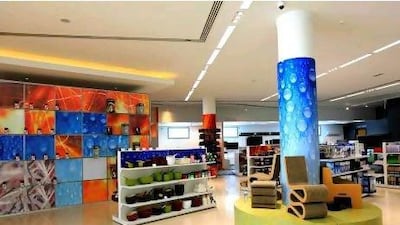DUBAI // Gundeep Singh leads the way through his spacious showroom on Sheikh Zayed Road, past aisles of organic food, sustainable clothes, non-toxic cleaning products and solar-cell lamps.
His demonstrations of a collapsible bicycle that is allowed on the Dubai Metro and a stylish sink that captures used water for flushing toilets are interrupted by greetings from suppliers, staff queries and phone calls.
But the former banking executive keeps his cool.
"We are focusing on what is real, what is practical and what has real impact," says Mr Singh, founder and chief executive of The Change Initiative, the country's first shop dedicated to environmentally friendly products.
The store is expected to be open for business in Al Barsha by next Thursday.
While UAE consumers have been offered the choice to buy organic food and cosmetics for a good few years, this is the first time a wide array of "green" products has been available under one roof.
Environmental issues can be too complex for people to understand and some key challenges do not have easy solutions, Mr Singh says. This is why people are too often deterred from making the change.
"Instead of trying to debate something that is bigger than us, let us focus on the things we can do," he says.
In many cases, sustainable products are superior. They last longer and are healthier.
Their successful marketing lies in "demonstrating to people and giving them the right choice". It is also about making sustainability fun.
"You can live your life but you can still do things right," Mr Singh says.
He walks around the showroom where about 100 employees are hard at work. It is 10am but they look as if they have already been busy for more than a few hours.
There is a frenzy of cleaning, wiping, arranging, supervising, making phone calls and last-minute repairs. At the entry, a few staff are placing a ceremonial white-and-green ribbon with a bow across the sliding glass doors, preparing for the shop's launch.
The 5,109-square-metre space features products from about 60 companies. Goods are evaluated on several criteria measuring their environmental and health impacts, and the overall record of their makers.
A first step is knowing the company behind a product, says Valerie Hawley, the organisation's chief sustainability officer.
There are also various green labels, such as Ecocert, which evaluate a company's claims.
The company says customers should look for products that rely on renewable materials and safe, non-toxic ingredients.
The energy and water used in making the products is also important, as is the ease with which it can be recycled after use.
"Sustainability is so complex," Ms Hawley says. "We need to educate people in a more general sense. "For example, on the need to save energy and water, people need to understand principally why these are good for the environment."
All of the technologies and products on offer are demonstrated within the showroom, says Mr Singh.
A total of 30 per cent of the building's electricity comes from solar panels on the roof.
There is solar-heated water and solar lighting, non-toxic paints, recycled materials and air-quality monitors.
A sophisticated building-management system monitors the building's energy demands and makes adjustments, such as reducing the energy output of the air-conditioning system when the store is closed.
For Mr Singh, these are all a part of walking the talk: if the business offers sustainable solutions, it should be the first to use them.
The former yacht and sportscar owner has also had to adopt this thinking into his personal lifestyle. Out went the Porsches and in came the hybrid cars and solar-powered home.
"I worked very hard to change myself," Mr Singh says. "I am 20 per cent there."
He explains that while he enjoyed luxury earlier in his life, he eventually realised acquisition in itself is not happiness.
"I suddenly realised none of this made any sense," Mr Singh says. "What really matters is relationships and what you do every day."
But he is first and foremost a businessman, and at the heart of this venture is a willingness "to make sustainability commercially viable".
Mr Singh is eager to see the response upon the store's opening.
"Fingers crossed, I think people will be curious about us," he says. "We will find out very soon."

